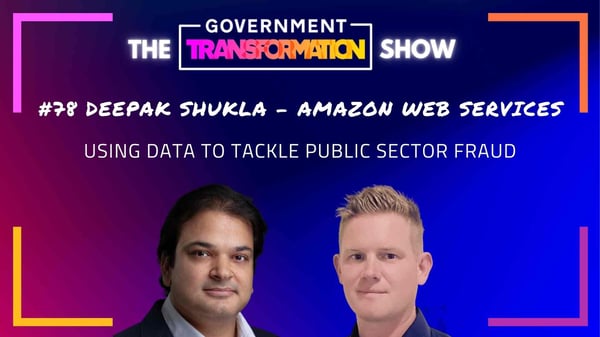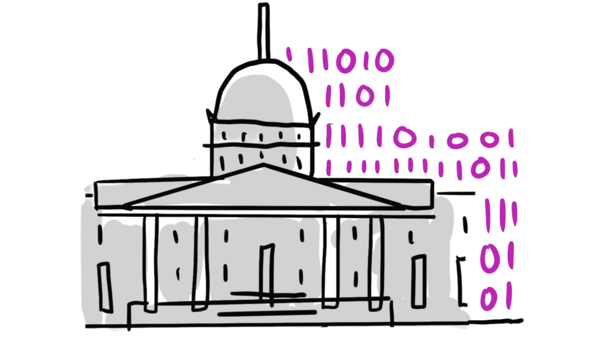Data as an agent of government transformation
How do we make data deliver transformational outcomes for citizens, businesses and Civil Servants in an era of ‘perpetual uncertainty’?
That was the opening question of one of the panel discussions at last week's Government Data Summit, featuring perspectives from across the Civil Service - and from further afield.
Lien Bailey, Chief Data Officer at Intellectual Property Office, John Seabourn, Chief Digital Officer at North Sea Transition Authority, Mark Azzam, Chief Data Officer at Germany's Ministry for the Environment, Nature Conservation, Nuclear Safety and Consumer Protection, André Loranger, Chief Data Officer at Statistics Canada, and Chris Stanley, Head of Data & AI Solutions at Kainos, were on hand to share their perspectives on how they intend to use data better to minimise uncertainty and unlock delivery.
You cannot transform what you cannot see
 "Tapping into unstructured data has the biggest potential value," said Mark Azzam, Chief Data Officer at Germany's Ministry for the Environment, Nature Conservation, Nuclear Safety and Consumer Protection. "Our priority is to build a system to support strategic management by providing the right information to the right person at the right time."
"Tapping into unstructured data has the biggest potential value," said Mark Azzam, Chief Data Officer at Germany's Ministry for the Environment, Nature Conservation, Nuclear Safety and Consumer Protection. "Our priority is to build a system to support strategic management by providing the right information to the right person at the right time."
Against the backdrop of transitioning to a net zero future and the havoc in global energy markets, he underlined that in this complex environment the biggest question is 'do we know what we should be looking for?'
"What we need is an information inventory," Azzam continued. "Think of it as a digital twin of our information load. We have lots of memos and drafts, with a lot of information in it - I don’t need to know what I’m looking for, I can just show old documents and then the right documents are suggested to me."
Drain the (data) swamp
"We are a very heavy casework organisation - lots of designs, blueprints, photos. We also hold a lot of historical information, which holds great value - and is of particular value for the British Library and the National Archives," said Lien Bailey, Chief Data Officer at IPO.
 Bailey has worked in Data and Information projects for over 23 years, and held senior roles within public and private sector organisations where her experience has helped deliver data capabilities on the Test & Trace Programme, and before that to deliver the analytics strategy and capabilities for the Global Operations of HSBC, and Barclays Treasury.
Bailey has worked in Data and Information projects for over 23 years, and held senior roles within public and private sector organisations where her experience has helped deliver data capabilities on the Test & Trace Programme, and before that to deliver the analytics strategy and capabilities for the Global Operations of HSBC, and Barclays Treasury.
"The one thing that data can do if it is dependable is to tell a story about what has happened, so you can make a decision that is dependable," she continued. "So the priority is to ensure you have available trusted data within the organisation. Do this, and you can then use it to hypothesise what if questions. Otherwise you have a data swamp!"
.jpg?width=250&height=333&name=Photo%20Andre%CC%81%20Loranger%20(1).jpg) "As part of a national statistics organisation, our role is to provide insights; I have to simplify things to enable us to go bigger, better, faster," said André Loranger, Chief Data Officer at Statistics Canada. "We have embarked on this large transformation to try and become more responsive - to leverage data science to improve our business - to improve collaboration, because one organisation cannot have all the answers - and to educate officers with respect to data."
"As part of a national statistics organisation, our role is to provide insights; I have to simplify things to enable us to go bigger, better, faster," said André Loranger, Chief Data Officer at Statistics Canada. "We have embarked on this large transformation to try and become more responsive - to leverage data science to improve our business - to improve collaboration, because one organisation cannot have all the answers - and to educate officers with respect to data."
"I think we’ve been successful at raising the bar for the culture of data in government," he added. "How do we leverage data? What story we tell? How do we tell that story? These are critically important questions to have answers to!"
"How do we create a culture of change?" asked John Seabourn, Chief Digital Officer at North Sea Transition Authority. "Because it is not about what data you have, but how you use it and how that changes behaviour."
 Seabourn's remit is to digitally transform the organisation to influence and regulate the Oil and Gas Industry in the UK. He has overseen the development of the Digital Energy Platform, which provides data services to industry, government, academia and the public.
Seabourn's remit is to digitally transform the organisation to influence and regulate the Oil and Gas Industry in the UK. He has overseen the development of the Digital Energy Platform, which provides data services to industry, government, academia and the public.
The platform has rapidly grown since 2016, attracting investment into the UK Continental Shelf, supporting the Energy Transition and providing resources to develop the next generation of energy data professionals.
As an example of changing behaviour through data use, he shares that a decision to ditch spreadsheets within the organisation led to a transformation of internal decision-making and what NSTA was able to do with data.
Another example he shares was when NSTA brought together the Managing Directors of oil and gas companies, and revealed how each company ranked against its peers across more than 20 benchmarks of data quality. This highlighted the issue, and led to a dramatic improvement in data quality.
 "Embedding a process to deliver an outcome, and then deliver little steps along the way, I believe is the best way to deliver transformation through data," says Chris Stanley, Head of Data & AI Solutions at Kainos.
"Embedding a process to deliver an outcome, and then deliver little steps along the way, I believe is the best way to deliver transformation through data," says Chris Stanley, Head of Data & AI Solutions at Kainos.
With over 25 years’ experience in the design and development of enterprise-wide data strategies, he has a strong background in legacy data modernisation and transformation initiatives.
"What data do we have that’s good enough to generate outcomes that deliver value? We work with the Institute of Migration - and one of their challenges is how to react to a global situation. So what we’ve been working with them on, is to trust that the information we have is reflective of the situation."
Operationalising AI in Government
"We’ve all heard about digital twins, and I'm interested in the potential for bringing together AI and digital twins," shared Azzam. "The World Avatar project driven by a University of Cambridge academic based in Singapore, is building on ecologies and semantics, and allows you to model from a molecular to systemic level, using a framework that is very flexible. The beauty is that you can answer a lot of very different problems within one framework."
.jpg?width=250&height=250&name=Quote%20Cards%20-%20ArticleSocial%20(4).jpg) As the world becomes more interconnected, the speed of innovation and creation is accelerating and business models are changing - IP portfolios are becoming more complex, and the number of IP filings is dramatically increasing. It is against this backdrop that the IPO has set itself an ambitious target to be the world's best IP authority.
As the world becomes more interconnected, the speed of innovation and creation is accelerating and business models are changing - IP portfolios are becoming more complex, and the number of IP filings is dramatically increasing. It is against this backdrop that the IPO has set itself an ambitious target to be the world's best IP authority.
"We are currently one-and-a-half years in on a four year transformation plan," explained IPO's Bailey. "We're already using AI to help understand whether something can be registered or patented. This saves us time and money, but it also saves the user time and money. So I think AI will be integral - both how we patent AI, but also how we use it on our patent management. This is why we are bringing it into our transformation programme."
"AI can be very useful in driving operational efficiency," agrees Kainos' Stanley. "More organisations will look to do that, but they must not let perfect be the enemy of 'good enough'. You need to ask yourself whether the data is good enough for the outcome you’re looking for."
Before joining the Federal Ministry, Azzam worked at the German Aerospace Centre as the Executive Board Representative for Digitalisation and drove the development and implementation of AI-based strategic management tools.
"I'm not interested in logical inference from AI, but rather for AI to help in providing all the information necessary to answer a question," says Azzam. "I think the opportunity for AI is providing information and then leaving it to the human in charge to make the decision. Used properly AI should allow us to get rid of human bias in terms of 'what do I know?' and 'what do I need to know?' in order to make the best decision."







